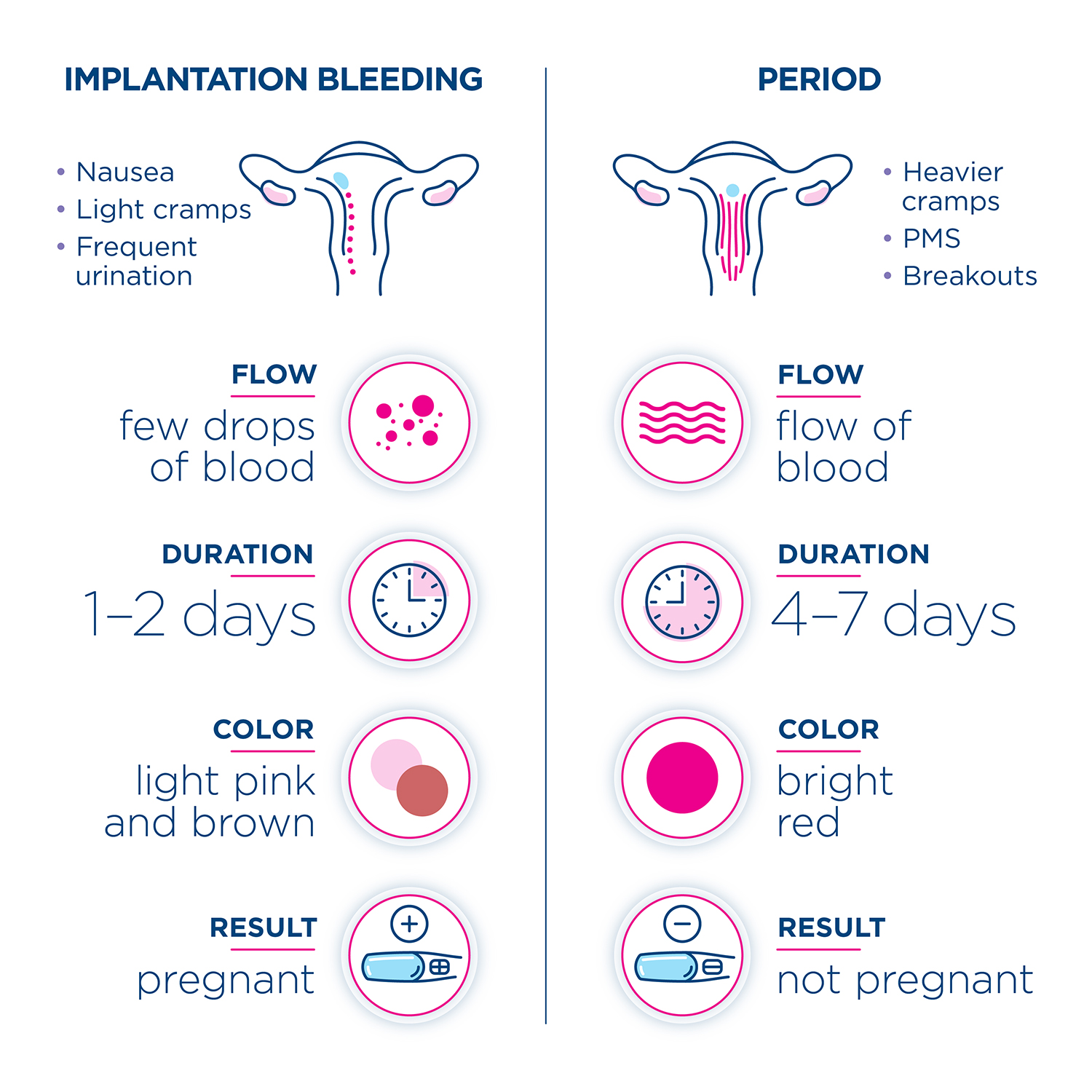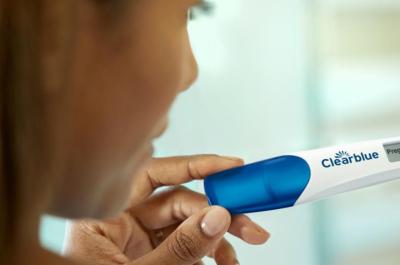Spotting after a positive pregnancy test: What it could mean

Nothing in this article is or should be construed as medical advice; for any medical questions, consult your healthcare professional.
One minute you’re auditioning baby names in your head, and the next, you feel something down there. You run to the nearest bathroom to check it out and see small spots of blood in your underwear. You’re likely worried. Here are answers to questions you may have about spotting after a positive pregnancy test.
Spotting during pregnancy
It’s important to call your healthcare professional any time you experience bleeding or spotting while pregnant.1 Although your brain may be running through all sorts of scenarios, it’s important to note how much you’re spotting or bleeding, if there are any clots, and the color (such as light pink and brown or bright red) — these are things your healthcare professional will likely want to know.2,3 It’s also important to know that spotting after a positive pregnancy test can mean different things, and not all of them are serious.1 Let’s take a closer look.
Is spotting normal during pregnancy?
Spotting in early pregnancy is more common than you may realize, and many women go on to have healthy pregnancies.1,2 According to The American College of Obstetricians and Gynecologists (ACOG), “Bleeding in the first trimester happens in 15 to 25 in 100 pregnancies.”1 This reflects all causes of early pregnancy bleeding, including more serious causes, such as early pregnancy loss.1
How long does spotting last in early pregnancy? At what point should I call my healthcare professional?
Spotting or bleeding during the first trimester can vary in length, depending on the cause. According to Mayo Clinic:
- “Tell your health care provider at your next prenatal visit if you have spotting or light vaginal bleeding that goes away within a day.”2
- “Contact your health care provider within 24 hours if you have any amount of vaginal bleeding that lasts longer than a day.”2
- “Contact your health care provider immediately if you have moderate to heavy vaginal bleeding, pass tissue from your vagina, or experience any amount of vaginal bleeding accompanied by abdominal pain, cramping, fever or chills.”2
What does pregnancy spotting look like?
Just like everyone’s period and vaginal discharge differs, spotting that appears after a positive pregnancy test can vary. Light bleeding and spotting during early pregnancy can appear as:
- Brown discharge
- Light pink and brown spotting
- Bright red spotting3
6 reasons for spotting in early pregnancy
Implantation bleeding
You may be wondering: Is brown discharge a sign of pregnancy? It could be! You may experience light pink or brown spotting after a positive pregnancy test. This could be due to implantation bleeding. According to ACOG, “Light bleeding or spotting can occur 1 to 2 weeks after fertilization when the fertilized egg implants in the lining of the uterus.”1 Not everyone experiences implantation bleeding, and if you tested early, you may not realize you had implantation bleeding because of when it might occur — two weeks after fertilization is around the time you would expect your period.
Because implantation bleeding can happen around the same time as you might expect your next period, it’s important to recognize a few key differences. (Even if you suspect it’s implantation bleeding vs. a period, give your healthcare professional a call.)

Pelvic exams or sex
According to ACOG, blood vessels developing around the cervix can cause light bleeding or spotting.1 This is why light bleeding or spotting after sex or a pelvic exam during early pregnancy can be common.1
Infections
Sexually transmitted infections (STIs), including chlamydia and gonorrhea, may cause spotting or light bleeding during pregnancy.4 Urinary tract infections (UTIs) also can cause spotting or light bleeding during pregnancy.4 You should always have a suspected infection examined by a healthcare professional.4
Cervical polyps
Cervical polyps are often benign growths in your cervix that, while common during your reproductive years, are actually uncommon during pregnancy.5 Symptoms may include bleeding and vaginal discharge.5 Even if there is suspicion of cervical polyps, because spotting and light bleeding during early pregnancy can be caused by many different things, your healthcare professional may do an ultrasound to be certain.5
Early pregnancy loss
According to ACOG, “Bleeding is the most common sign of miscarriage.”6 You may also notice tissue or fluid coming out of your vagina.6 If you suspect an early pregnancy loss, call your healthcare professional as soon as you can.6 Your healthcare professional may do an ultrasound, bloodwork or a pelvic exam — and you may want to bring someone with you for support.6 Remember: While bleeding and spotting in the first trimester can happen, and many women go on to have healthy pregnancies, early pregnancy loss is also common.1,2,6
The shock of discovering blood while pregnant followed by the news of an early pregnancy loss can be difficult and heartbreaking. Be gentle with yourself. It may be of some comfort to know that repeated pregnancy loss is rare. According to ACOG, “It’s estimated that fewer than 5 [women] in 100 have two miscarriages in a row.”7
Ectopic pregnancy
Sometimes a fertilized egg implants outside of the uterus.8 This is called an ectopic pregnancy. Most of these pregnancies take place in a fallopian tube.8 Only a uterus can sustain a pregnancy. If a pregnancy occurs in the fallopian tube, it can burst, resulting in a life-threatening condition.8
If you suspect an ectopic pregnancy, contact your healthcare professional immediately. Ectopic pregnancy symptoms may mimic early pregnancy symptoms and they may also include abnormal vaginal bleeding, pain (which can be mild) in the abdomen, pelvis or lower back, and cramping on one side.8 According to ACOG, you should head to the emergency room immediately if you experience severe pain that comes on suddenly in the pelvis or abdomen; weakness, fainting or dizziness; or shoulder pain.8
You may have a lot of questions if you start spotting or bleeding after a positive pregnancy test. First, remember it’s a common occurrence for many women. Second, call your healthcare professional. They will ask you questions and likely perform a physical exam, conduct an ultrasound and/or test your hCG levels, and help you determine the next best steps.
Related Articles
Sources
- The American College of Obstetricians and Gynecologists. Bleeding during pregnancy. Updated August 2022. Accessed February 5, 2024. https://www.acog.org/womens-health/faqs/bleeding-during-pregnancy
- Mayo Clinic. Bleeding during pregnancy. Updated January 20, 2022. Accessed February 5, 2024. https://www.mayoclinic.org/symptoms/bleeding-during-pregnancy/basics/when-to-see-doctor/sym-20050636?p=1
- Hasan R, Baird DD, Herring AH, Olshan AF, Jonsson Funk ML, Hartmann KE. Patterns and predictors of vaginal bleeding in the first trimester of pregnancy. Ann Epidemiol. 2010;20(7), 524-531. doi: 10.1016/j.annepidem.2010.02.006. Accessed February 5, 2024. https://www.ncbi.nlm.nih.gov/pmc/articles/PMC2884141/
- Cleveland Clinic. Bleeding during pregnancy. Updated November 17, 2021. Accessed February 5, 2024. https://my.clevelandclinic.org/health/symptoms/22044-bleeding-during-pregnancy
- Alkilani YG, Apodaca-Ramos I. Cervical polyps. National Library of Medicine. National Center for Biotechnology Information. StatPearls [Internet]. Updated September 4, 2023. Accessed February 5, 2024. https://www.ncbi.nlm.nih.gov/books/NBK562185/
- The American College of Obstetricians and Gynecologists. Early pregnancy loss. Updated May 2023. Accessed February 5, 2024. https://www.acog.org/womens-health/faqs/early-pregnancy-loss
- The American College of Obstetricians and Gynecologists. Repeated miscarriages. Updated January 2023. Accessed February 5, 2024. https://www.acog.org/womens-health/faqs/repeated-miscarriages
- The American College of Obstetricians and Gynecologists. Ectopic pregnancy. Updated July 2022. Accessed February 5, 2024. https://www.acog.org/womens-health/faqs/ectopic-pregnancy

What are the early signs of pregnancy?
There are various symptoms that can indicate you might be pregnant, even if you might not experience any/all of them.







